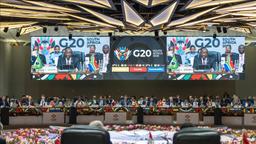Related Publication Files

Report / Fatih Özatay, PhD
"The global financial crisis caused sharp output and employment losses in most of the advanced- and emerging-market economies, and triggered an intense discussion on how to achieve financial stability and design an optimal financial architecture to minimize the risk of occurrence of such a financial crisis once more. Obviously, this debate has focused on preventive measures and looks into “before” a financial crisis. An equally important subject is the enormous problems faced “after” the global financial crisis and their linkages with a lack of policy cooperation among systemically important advanced- and emerging- market economies. This study aims at analyzing the problems faced by the emerging-market economies in the G20—Argentina, Brazil, China, India, Indonesia, Mexico, Russia, Saudi Arabia, South Africa, and Turkey (the EMEs in short) —and their economic policy response after the collapse of Lehman Brothers during the 2008 global crisis. If any, what are the regularities? Why was there international policy cooperation up to 2010? Why was not it sustainable? What is the role of domestic policy cooperation in the observed divergent monetary policies of the EMEs? What are the policy lessons that can be drawn? These are the main questions that this study addresses...."




